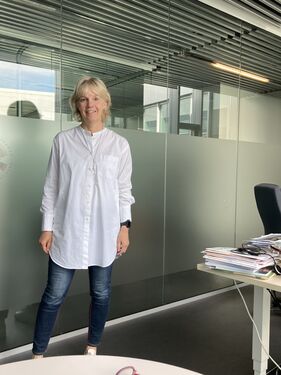Huge transformation in engineering teaching lies ahead
Nordic universities work and learn from each other
The engineering department at Reykjavik University participates in a project called STEM skills and competencies for the new generation of Nordic engineers. The aim of the project is to create new knowledge of engineering education to support learning and teaching in the Nordic countries by compiling, analyzing, and presenting information on education in science, technology, engineering, and mathematics (STEM) which contributes to the development of engineering education.
Dr. Lena Gumaelius, associate professor at KTH (Kungliga Tekniska Hoegskolan) in Stockholm is the research leader of the group Engineering education in Society. She recently visited the RU engineering department introducing the project and its main findings.
„I am really interested in us getting to learn from each other in the Nordic region. I am an engineer and researcher in engineering education and that´s how I started to work with organizing other Nordic countries working together. Amongst the Nordic countries, our strength is that we are similar but also different, so the culture, attitude, and climate are similar, but we have developed different steering systems and different political agendas. I think we can learn a lot from each other because we understand each other but we have taken different paths when it comes to some issues. For instance, we all want to increase our interest in STEM subjects that are similar in all the countries but we have taken slightly different paths here. So, if you go to Denmark the government has provided funding for that and that kind of activity in Sweden, we have done it a bit differently, etc. Just by comparing those things we can learn so much from each other. As we are so similar it is easier to implement some things in the government, schools, etc.”
 Lena has been working on the project Nordic EngineeringHub, that's now being expanded to the Baltic countries as well. Connected with that Lena and her team have interviewed faculty members from RU and four other universities in different countries. Again, there are some similarities and differences between the universities and Lena mentions that Reykjavik University has for example done innovative things when it comes to how implementing sustainability in engineering education. This is something other universities can learn from and RU on the same hand RU can learn to avoid possible mistakes from other countries ‘experiences.
Lena has been working on the project Nordic EngineeringHub, that's now being expanded to the Baltic countries as well. Connected with that Lena and her team have interviewed faculty members from RU and four other universities in different countries. Again, there are some similarities and differences between the universities and Lena mentions that Reykjavik University has for example done innovative things when it comes to how implementing sustainability in engineering education. This is something other universities can learn from and RU on the same hand RU can learn to avoid possible mistakes from other countries ‘experiences.
„We stand in front of a huge transformation when it comes to education because of the digitalization and other challenges as well. Just the fact that we can now teach online and accept continuous training where everybody should be able to go back to university, is important. Those things will make the form of education more flexible, and the content of education will also change because of sustainability issues and other such things. The form of how we create flexible education is already changing rapidly. We see in our studies that we need to think about how we train our faculty so everybody can be on that journey. I think we are going towards an era where we will use university more as professionals as well. For instance, if you work in an industry, I hope it will be natural for you to come back and I think eventually it will not be that important to have a five-year program degree exam. Rather I think you might work on your portfolio, work for a few years, and then go back to university, etc.”

